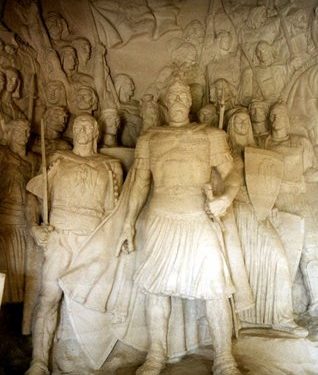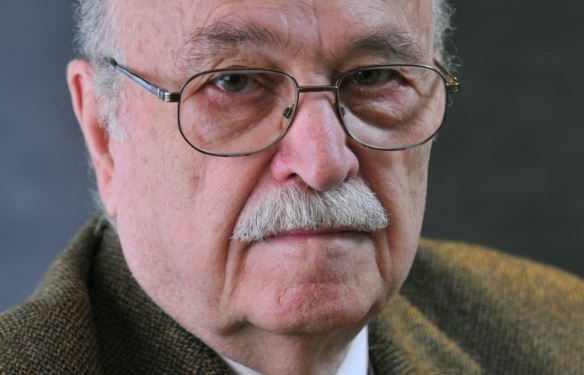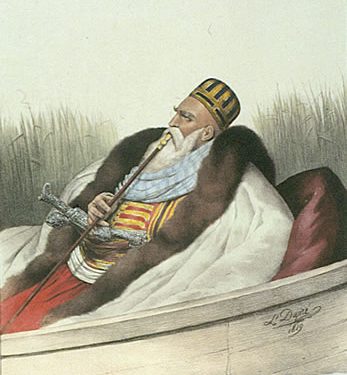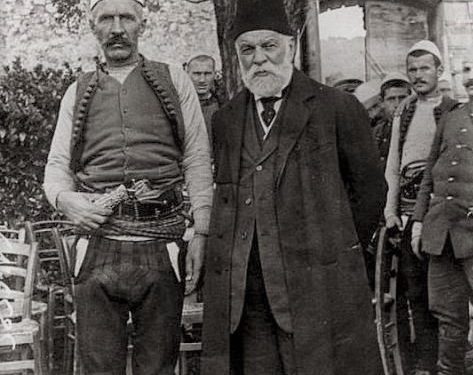From Prof. Dr. ALEKSANDER MEKSI
Memorie.al / The book “Albanians” is the product of the pen of a powerful, well-rounded personality with an encyclopedic culture who mastered several foreign languages. Mit’hat Frashëri, known in literature by the pseudonym “Lumo Skëndo,” was a prominent figure among his contemporary intellectuals and patriots. As the last scion of the distinguished national Frashëri family, Mit’hat Frashëri did nothing but follow in the footsteps of his ancestors, who dedicated their lives, abilities, and talents to their homeland, becoming symbols of patriotism and national culture.
Like Samiu, Naimi, and Abdyli, he would be at the forefront of the struggle for national awakening, for the freedom and progress of Albania and Albanians everywhere in the world. He would strongly influence, with his dense political and journalistic activity, the transformation of feudal Albania, with a mindset from the Ottoman Empire at the peak of its decadence, into a developed country that would coexist in harmony with its always-greedy neighbors. He did not chase wealth but strove for Albania and the country’s cultural progress.
The work was first published in French in 1919 with the original title “The Albanians in Their Country and Abroad.” It was translated by Ferdi Tirana and published by the “Zenit” publishing house in 2002, which should be commended for this valuable initiative. The book was sent in the form of an essay to the distinguished Balkanist, Eugene Pittard, a professor at the University of Geneva, under the pretext of “verifying the values” of his work with a renowned historian.
However, in addition to this, I believe it was also a call for attention, an appeal made to European scientific authorities on the eve of the Peace Conference for the protection of the Albanian cause, which was being trampled by the Great Powers in the drafting of the Peace Treaty after the curtain of World War I had fallen. Mit’hat Frashëri hit the mark; Pittard became one of the fervent defenders of the Albanian cause. He replied: “President Wilson is today the arbiter of the world. He has the highest sense of justice. I wholeheartedly wish that you, through history, can arouse his interest in Albania and its fate. The same goes for all the Allies, which is essential for securing your rights.”
We do not know if Mit’hat Frashëri distributed his work to the delegations at the Peace Conference, but it is a fact that only the American President, Wilson, insisted on the right of the Albanian people to have a state within its natural borders, a right that was denied by the machinations of European countries, tied by their interests to our great-appetite neighbors. The author must have been working on the book “Albanians” for a long time, as such creations require years of research and study in archives, libraries, and chanceries, but he brought it to light only when the country needed it.
Later, the “materials” that had “given birth” and inspired the essay “Albanians,” supplemented and expanded, “without interventions and comments,” the author published them in the magazine he directed himself, “Dituria,” from 1919 to 1930, in a special section that was awaited with great interest by the readers of the time. Although written almost a century ago, the work “Albanians” has an appealing composition even today. In it, the historical event and fact are melted into a unique form, along with travel notes with various events and happenings, and the reports of a conceited and short-sighted consul, and a market agent who listed economic data, markets, and crafts, with the aim of what could be sold and bought in this country rich in economic resources.
But in the work, we also have the notes of a researcher who collected words and expressions of a rare language he could not classify, customs, and traditions of an original community with an aristocratic gene, until then forgotten and unknown in the middle of Europe. The diversity of the forms of the “raw material” did not prevent the author from placing them impartially on a common denominator, creating a homogeneous work, even though the writings covered a time span of several centuries.
So, it was a special “material,” historical, literary, scientific, etc. In any case, the purpose of its drafting and publication remained the same; through the sayings, considerations of foreigners, objective and benevolent towards the nation, to make Albanians aware of their intellect, strength, character, and energies, which not only could pull the country out of backwardness but also make it “the most beautiful of the beautiful.” They not only lacked nothing from other peoples but also stood out for precious qualities that were sometimes lacking in them, such as trustworthiness (Besa), honesty, resilience, etc. Lumo Skëndo does not write to enchant but out of the trouble that had afflicted the people, who, as his great contemporary, Fan Noli, says, “unlearned near knowledge, unfed near the table,” a trouble that continues even today, but now as an absurd testimony in the service of malicious neighbors and their sycophants in Albanian politics.
Of course, the author has only listed the good sayings, the most positive considerations about them, so much so that the work can be called a catalog of the prominent qualities of Albanians, and this is not to boast or for pride, which is also a quality of Albanians, which we also find in the Arbëreshë of Italy. Some exaggeration or hyperbole may appear, but the truths are accurate and verifiable. We are only aware that the writings against are more numerous, full of slander, exaggerations, and distortions, which continue even today with paraphrases from NGOs and leaders. Our enemies had the opportunities and means to trample the Albanian nation, which went from crisis to crisis, from conflict to conflict, accompanied by chronic poverty and the perpetual hemorrhage—emigration.
The exaggeration of evils, insults, and denigrations in the 19th century, when the Balkan states were formed, but also before and after, were generally cooked up in the kitchens of neighboring chauvinists or their European friends and supporters. In these black enterprises, the “help” of local politicians was not lacking even then, who have always been diligent in destroying their own country, more than the invaders themselves, as long as they could profit. Even today, in the age of television and the internet, slander, fabrications, and distortions are not lacking, although they are more sophisticated and multiplied, but they do not leave the same impression as before. Television, the electronic mass media, has simultaneously eliminated temporal and local borders.
One of the thoughts that one gets from the first reading of the work is the fact that no people in Europe has striven and toiled for freedom and independence so much and for so long as the Albanian people. Only now, after almost a century since this work was written, it seems that Albanians are able to be closer to realizing a part of their old dream. Every work of a historical nature is evaluated in many directions, by the documents it offers, by the thoughts it conveys, and by the authenticity with which it brings the time it talks about. The work “Albanians” proves the saying that history is part of the present and the future. It truly has a powerful current resonance, and it is not difficult to notice that many phenomena of today find an explanation in the past.
In the conditions of mass exoduses and emigration, unemployment, and lack of perspective, Albanians are forced to deviate from their nature, and in conditions of extreme poverty and depression, to even commit acts outside of their moral and historical codes and constitution, few in number, but which are amplified by foreigners with a vested interest in a negative portrayal.
Therefore, the author, more than the presentation of natural, geographical, political, economic, and religious peculiarities, pays more attention to the spiritual qualities of Albanians, the enlightened figures in the world, their contribution, especially within the framework of the Ottoman Empire and in neighboring countries. The enumeration is rich; great Albanians have made history everywhere, they have been Popes, Emperors, military strategists, royal families, 35 Sadrazems (Prime Ministers) of the Ottoman Empire, hundreds of Pashas, Dukes, and Counts in Catholic Europe, founders of states, like Mehmet Ali in Egypt, heroes of revolutions, such as in Greece and Romania… so many. Albanians were the best in the world and the worst to themselves.
It is not hard to understand that Turkey had exercised its sovereign power in Albania and beyond with the Albanians themselves who worked for it, who had more of an imperial vision than a national one. Knowing this fact, to remove the possible danger of their national awakening, the empire made them part of the power cake, a power that extended over three continents and was surviving in the 20th century, thanks to the rivalries of the superpowers of the time. Therefore, the delayed separation of Albania is also explainable, which was more of a mutilation of its territories. At the time when Mit’hat Frashëri lived, the last period of the National Renaissance, Albania was perceived by many foreigners more through the legendary deeds of our National Hero, Gjergj Kastrioti-Skënderbeu, and through the exotic stories about Ali Pasha Tepelena.
The foreign authors, cited, commented on, and paraphrased, all note one fact: Albanians have an identity (a fashionable word today) that is clear and distinct from their neighbors and rulers; they are brave. It was precisely this quality that made them soldiers not only in various provinces of the empire but also to fill entire legions near kings and princes, such as in Italy, Spain, etc. Albanian soldiers or mercenaries, guards or servants, companions or guides, were the most preferred in those times, because in addition to bravery, they also had other precious qualities such as: honesty, loyalty, diligence, and patience, full of inexhaustible energy to be resurrected and renewed. The Albanian chose this “craft” to survive and to defeat the poverty that his homeland provided, but he has never been barbaric and aggressive or violent, qualities that stand out in many of the selected writings in the work.
Albanians have a very strong sense of family. Besides what has been written or said in the Kanuns or in the so-called “laws of the mountains,” the Albanian family has a special organization where the rule and order of things, the sense of solidarity and sacrifice among members reign. For the survival of the family, men often take the arduous path of emigration for years. And the meager savings, all of them, they bring to their large family. The cult of the family is inseparable from the cult of the house, the hearth, or the chimney, a quality that stands out even today throughout the country.
Lumo Skëndo has dedicated a prominent place to the Albanian as a worker, a good shepherd, a knowledgeable farmer, a construction worker who dared to undertake even great cult works that today have become monuments of world culture. In these constructions, the names of dozens of famous architects stand out, starting with the architect Kasemi. It is well known that animal husbandry, construction, and paid military service were the basic professions of Albanians throughout the Middle Ages, and in their practice, they stood out and created a tradition, even though those professions were the most difficult. Another quality that emerges from foreigners and that the author has given a place in the work is the lack of religious fanaticism among Albanians.
Lumo Skëndo has a nimble pen and writes a lively and dynamic prose, full of nerve and temperament. The different disciplines are melted into one, and we read it with pleasure; both as an exotic history and as a contemporary narrative, as well as an ethical or sociological treatise. This is an indicator of a great talent and erudition that not everyone possesses even today, at a time when literature and the arts have removed the barriers between them and are always in search of new identities.
Mit’hat Frashëri had a premonition of the “future currents.” The beautiful ratio of historical fact and the wise and objective commentary or treatment that the author makes is also a captivating aspect. Everything is accurate and in its place, convincing and argumentative. The small stories, the events of a difficult journey, the stoicism, and the honesty of the Albanian companion can serve as a starting point, as an incentive for original works in short prose.
Such publications are of incalculable value for Albanians here, but even more so for those who have chosen emigration. Such books also have a special value for foreigners, especially for those who want to know Albania and Albanians as they really are. But they have an even greater value from a patriotic point of view for those who denigrate Albania and Albanians on behalf of foreigners, in these troubled years of the Europeanization of the Balkans that seems endless, and of the demand for a solution to the Albanian issue, which lately we are not hearing about on both sides of the common border (it seems the arbëresh principle still holds value: better to be the first in the village than the second in the city).
This book makes you think that today’s Albanians, as well as foreigners, need to get to know the country and its inhabitants of the 19th century (and why not earlier) and the beginning of the 20th century, from the pens of foreign travelers and researchers who have passed through and lived in Albania. The scientific publication of their work, meaning with commentary and necessary explanatory details today, would be useful for the likes of Gill and his friends who write on behalf of their governments and our neighbors. And not only them, but we ourselves will better understand our own history, and others will get to know and understand us more. This way, we will move away from malicious or inaccurate stereotypical judgments, but also draw data from old historians.
Unfortunately, such work has been left to chance and the goodwill and patriotism of individual publishers, while state structures, through foundations and open programs, should enable such high-level publications, a good part of which should be transferred to schools and libraries, otherwise we will continue to hear fairy tales about Albanians, whether here or in foreign languages with no benefit at all. I think the time has come to conduct studies on these peculiarities, characteristics, or aspects, the causes of their emergence, their spread in the Albanian space, the changes they have had over time, and above all, the ways of fighting them and the consequences of their actions.
Similarly, there should be studies with accurate data on negative actions and phenomena (alongside positive ones) of Albanians at home and abroad, and not tales from well-paid NGOs. The results of these studies should be made known to both the local and foreign public opinion, because the exaggeration of negative phenomena affects the country’s development, integration into Europe, and in general, in progressive civilization.
Albanians have shown throughout their troubled history, and are showing even today, that they are a special people with a face of their own, with a clear mentality, customs, and traditions, distinguishable from others, but who have known how to coexist with them when this was necessary or could not be avoided, but they have never aimed to assimilate or destroy them. Albanians, even with difficulty, have changed and progressed over time (more so those who had contact with the progressive world, less so those who were isolated).
Such a thing is best seen today, a time of great upheavals, except that it must be done in a non-chaotic way, but by judging what is good and useful for both the individual and society. In this regard, the role of a truly legal and democratic state, alongside education and culture at truly contemporary levels, are and must be guiding and decisive.
Various sayings about Albanians and Albania:
“…How beautiful the Albanian with his red clothes looks next to them, coming before us majestically on his horse, with the rifle placed on the side of the saddle, with the appearance of a winner and the gait of a gentleman. He comes from Korça and without any other wealth except his rifle and bravery; he goes to seek his fortune in Istanbul. He will become a zaptie, a prefect, an ambassador, perhaps the grand vizier, and wherever he goes, he will keep his rank.”
Viktor Berardi
“Whether a grand vizier in Istanbul or a shepherd in the solitude of Pindus, the Albanian is an aristocrat, a free man, a nobleman.”
Rene Pinon (1917)
“The Albanian is a child people. An energetic push must be given to them with care, wisely on the path of order and education, and no one can doubt that he will soon take the place that belongs to him among the civilized countries. Let’s not forget that Albanians are very smart.”
E. Reclues, Geographie universelle, Paris 1836
“Albanians have lived very little for themselves. Their activity, their blood, their talent have been benefited by their neighbors. They have sacrificed their best essence for the good of others.”
M. Bernardit
“Albanians are probably the most beautiful race in Turkey… you will find among them types worthy of being taken as models for Aphrodite and Apollo.”
D’Ami-Boue, European Turkey. Paris 1840, Volume Two
“…that Albania, in which no idea of conquest exists, aims at nothing else but to preserve its historical borders (its ancient borders were larger) and to peacefully reform the Albanian State, which, better than any form of government, will ensure the maximum of individual freedoms for all its citizens.”/Memorie.al
Eugen Pittard (1919)














